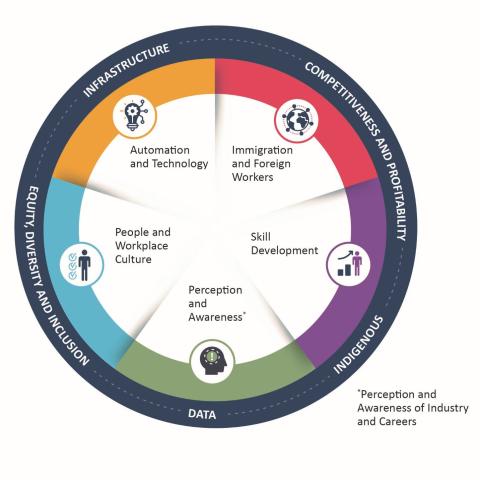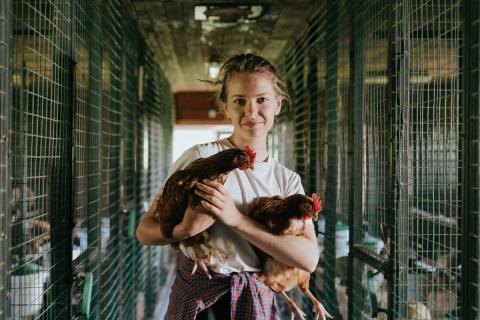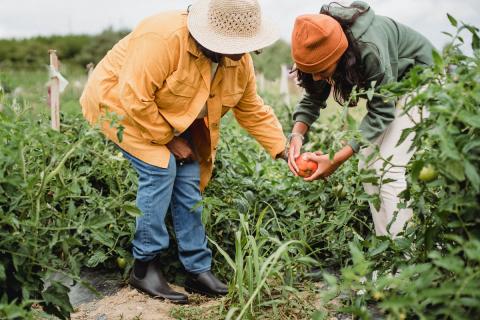Watch our Employer Compass videos to learn trusted tips on leading strong, successful, motivated teams.

Tourism can take you there
Forge your own path with a career in tourism.
Your next career move could be your greatest journey yet. Discover what’s out there.

Adventure Tourism
Curiosity, boldness, and a passion for discovery will take you far in this thrilling industry. .

Cultivate the comforts of home for travellers visiting from around the world.

Restaurants
Delight visitors through the art of food—the complex flavours, savoury aromas, and creative presentation. .

Event Management
Create meaningful experiences that bring people together through music, entertainment, and visual spectacle..

By air, sea, railways or roads—explore new horizons and help others along on their journey.

CULTURAL TOURISM
Celebrate canada’s vibrant history and diversity by sharing our stories with the world..

Elevate and Explore Black Nova Scotia
She started a tourism business—and welcomed an entire community to Nova Scotia

This Explorer Embraces Travel in Life and at Work

Wapusk Adventures
One man’s passion for sharing his culture led him to return home—and stay

Raw Almond / Nola
A classical pianist took a part-time kitchen job—and it changed her entire life

Canadian Live Music Association
How one musician’s career soared to incredible new heights

Geldert Guest House
One couple’s search for a new home led to a new career
What kind of explorer are you?
Find the resources you need, wherever you’re at..
- Suggestion 1
- No results found

Lead the way for the next generation of tourism workers.

Job Seekers
Are you ready for a change of scenery?

Tourism Workers
Build the skills to grow further in your career.

Show your students what a future in tourism can offer them.

Career Advisors
Help talented people find where they fit.

Adventure awaits. Where will you find it?
Featured Tools & Resources
Employer compass series: 7 factors of a healthy work environment.
In this video, learn about the seven factors that influence a healthy work environment, and how you can foster an environment of collaboration, respect, and initiative.
Interactive Career Map
From coast to coast, exciting career destinations and tourism opportunities await. Find them with our Tourism Across Canada Map.
Employer Compass Series: Do These Hazards Exist in Your Business?
To learn how you can make your workplace safe for everyone, click the link to watch our video.
Is Tourism Right for Me?
Let your interests guide the way. Whether you have a love of fine foods, an eye for good art, or a thirst for adventure, there’s a career for you in tourism that will spark excitement. Find it here!
Managing Your Workforce: An HR Self-Assessment
Use this self-assessment checklist to ensure your skills and employment practices are up to standard, so you can lead your team to continued success.
Employer Compass Series: 5 Ways to Improve Employee Retention
Using some of the tips outlined in this video, you can make sure your employees feel recognized, respected, and fulfilled.
- Skip to main content
- Skip to primary sidebar
- Skip to footer

Choose Tourism
Welcome to emerit
Canada’s award winning training resources developed by the Canadian Tourism Human Resource Council (CTHRC) in collaboration with tourism industry professionals from across Canada. emerit offers support for:
Small Business A highly skilled workforce means bottom line profits.
Corporate and Chains Seamlessly integrate emerit skills training with your brand.
Education Superior skills create vast opportunities for success.
International Canadian made, internationally recognized training.
The benefits of emerit:
- emerit training products and programs are based on industry-defined standards, recognized across Canada. The range of emerit training products is incredibly diverse, encompassing many professional positions in the tourism sector. And they are created by professionals for professionals, making emerit the finest training resource available to the tourism sector.
- emerit works for everybody. Employees gain confidence from the increased recognition they receive from employers and co-workers. Businesses that have used the emerit line to enhance and recognize the skills of their employees in their respective fields continue to tell us about increases in repeat business, in word-of-mouth referrals, in incremental spending by loyal customers and efficiency of staff.
- The emerit brand includes National Occupational Standards, training tools, and Professional Certification program – all key components of the Council’s commitment to building the most professional Canadian tourism work force possible. The brand also includes online learning resources.
For more information on training your employees with emerit – please contact Alex MacKenzie at (902) 566-5008; Toll Free 1-866-566-5008 or email [email protected] .
Connect with Us
Phone: (902) 566-5008 Fax: (902) 368-3605 [email protected]
Subscribe to the TIAPEI Mailing List
Upcoming events.
There are no upcoming events.
- Add to Timely Calendar
- Add to Google
- Add to Outlook
- Add to Apple Calendar
- Add to other calendar
- Export to XML
- Breaking News
- International News
- Checking In
- Decor & Design
- Equipment & Technology
- Segment Reports
- Special Reports
- Supply Side
- Digital Issue
- Digital Issue Archives
- HotelierLive
- Icons & Innovators Videos
- Pinnacle Awards Videos
- Pinnacle Awards Winners
- Event Calendar
- Pinnacle Awards
- Top 30-Under-30
- Housekeeping Forum and Hotel Summit
- Icons & Innovators
- Green Leadership Awards
- Women in Tourism Hospitality Summit
- Anti-Racism Framework
- Ambassadors of Change
- Anti-Racism Commitment
- The Black North Initiative
- 50-30 Initiative
- Bridging The Gap
- Championing Change
- Web Exclusives
- Hotelier Subscription
- Print Subscription
- Digital Subscription
- E-Newsletter Sign Up
- Buyer’s Guide
- Privacy Policy
GoodLeaf Farms Partners with Pursuit
Canada hotels report first occupancy increase in four months, itac membership program sees record growth, cushman & wakefield presents innsights quarterly q1 2024, four women have left their mark on the hotel-design space, hotelier: ria letcher, north nahanni naturalist lodge, nwt, germain hotels refines its sustainability initiatives with a new strategic plan, robots are the future of hospitality in canada, e48. strength in numbers, may/june 2024 digital issue, e47. driving success , april 2024 digital issue, tourism and hospitality hr forum wraps.
TORONTO — Hospitality professionals gathered at the Toronto Marriott Downtown Eaton Centre Hotel this week for the 11th Annual Tourism & Hospitality HR Forum, which was highlighted by general sessions, an HR Boot Camp and an Educator Symposium — all focused on the theme of Talent Management: Strategies For Business Success.
“The focus is about being ready for a changing workforce,” said Philip Mondor, SVP of the Canadian Tourism Human Resource Council upon welcoming guests to a plenary session about the evolving work environment. “The way we’ve done things in the past is not how we can work moving forward.”
The session discussion was led by Leah Simon and Katherine Ford, both employment and labour lawyers from Toronto’s Sherrard Kuzz LLP. The duo reviewed the Ontario Human Rights Code, while emphasizing the need to reassess employment standards to accommodate an aging workforce. “One of the most dramatic changes coming is the age of the workforce,” said Ford, who pointed out that one in four workers could be 55 or older by 2021. “There’s going to have to be a change in who we look to attract,” she said. Ford suggested companies should entertain ideas such as extending group benefits, demanding less work hours and offering a brighter work environment to accommodate the mature worker. “You’re going to want to be more creative to make sure your [staff] remain engaged,” she added.
Other sessions at the event addressed Canada’s changing demographics, the use of social media to tap into talent, tips on increasing productivity and profit and more.
The annual forum is hosted by the Canadian Tourism Human Resource Council and The Ontario Tourism Education Corporation (OTEC).
Keep Reading
Growing Hotel Business In a New Economic Landscape
Rising Up Hospitality’s Corporate Ladder
Lodging Industry Calls on Government to Address Labour Shortages
RELATED ARTICLES MORE FROM AUTHOR
Leave a reply cancel reply.
Save my name, email, and website in this browser for the next time I comment.
This site uses Akismet to reduce spam. Learn how your comment data is processed .
POPULAR POSTS
The art and science of hotel valuation, 25 hotel trends of the past 25 years, segment report: luxury, full-service, boutique and lifestyle segments, popular category.
- Breaking News 4335
- Magazine 1108
- COVID-19 278
- International News 273
- Operations 230
- Features 138

Philip Mondor
President, Tourism HR Canada
About Philip
Mr. Mondor is President and CEO of Tourism HR Canada. Mr. Mondor is a recognized labour market specialist with more than 25 years of experience. His extensive work is both national and international, having worked with labour market stakeholders across Canada and abroad, including foreign governments, pan-global organizations, Canadian and non-Canadian businesses, and various education and training bodies.
Mr. Mondor led projects on ‘the development of systemic models’ concerning the recognition of foreign-trained individuals in non-regulated fields of practice that led to several initiatives that improved learner and worker mobility (e.g. Canada’s first qualifications frameworks, program valuation models, international competency standards). Currently, Mr. Mondor is an advisory member of the Ted Rogers School of Hospitality and Tourism Management, Ryerson University. He is a Board Member of the Events Management Body of Knowledge, an international group tasked with facilitating global standards of practice. He is a technical advisor to INSSO (International Network of Skills Sector Organizations) concerning methodologies for setting competency (industry) standards. Recently, Mr. Mondor was appointed to the Deputy Minister’s Advisory Council, Immigration, Refugees and Citizenship Canada.
Sign up for our newsletter
Language preference
350 Sparks Street Suite 604 Ottawa, Ontario K1R 0A4

- Skip to main content
- Skip to main navigation
- Accessibility Statement
More topics
Tourism hr canada - occupational certification tourism – go2hr the resource for people in tourism.
View all Registered Courses
Students may receive credit for earning the following national occupational certificates issued by the Canadian Tourism Human Resource Council: Food and Beverage Server, Front Desk Agent, Housekeeping/Room Attendant, Tour Guide, Reservation Sales Agent, Guest Services Attendant, Tourism/Visitor Information Counsellor, Banquet Server, In British Columbia, go2 administers the process.
The extensive work experience component may be used by senior secondary students enrolled in Work Experience 12 or it may meet the portfolio work experience requirement.
Certificate or Official Document
The signed certificate is white with a two-tone green and two-tone blue swish on the left side. The words “professional certification” are followed by the individual’s name, one of the specialty areas listed above and the wording “has achieved the highest level of recognition as a Professional Certified specialty through mastery of the knowledge and skill in the National Occupational Standards established by the Canadian tourism industry.” The white emerit logo appears in the lower left corner.
Contact Information
Dennis Green, Director, Industry Training 450 – One Bentall Centre, 505 Burrard St., PO Box 59, Vancouver, BC V7X 1M3 Phone: 604.633.9787 ext 235 Fax: 604.633.9796 Email [email protected] Website: www.go2hr.ca
The B.C. Public Service acknowledges the territories of First Nations around B.C. and is grateful to carry out our work on these lands. We acknowledge the rights, interests, priorities, and concerns of all Indigenous Peoples - First Nations, Métis, and Inuit - respecting and acknowledging their distinct cultures, histories, rights, laws, and governments.
Growing the AgriWorkforce
The Canadian Agricultural Human Resource Council is a national, non-profit organization focused on addressing human resource issues facing agricultural businesses across Canada.
National Workforce Strategic Plan
Our partners.

CAHRC, together with partners the Canadian Federation of Agriculture (CFA) and Food and Beverage Canada (FBC-ABC) have announced the launch of the National Workforce Strategic Plan for Agriculture and Food and Beverage Manufacturing .
Read the news release

Whether you manage HR full time or it is one of many hats, we have your tools for success.

Growing Opportunities: Work Integrated Learning opportunity for post-secondary students

Partnership is vital to our mission. With the support of our partners, we address the workforce challenges of Canada’s agriculture and agri-food industry.
Programs and Initiatives

AGRI LMI is a program focused on assessing the current agricultural labour market, projecting the future supply and demand for agricultural workers, and recommending potential solutions to the sector's labour issues.
AGRI Jobs supports the agricultural industry and employers by building nationally validated job information to clarify skills requirements for agricultural positions. In partnership with the AGRI Skills program, this job information provides tools that are targeted training options for agricultural employers, employees, associations and educators.
AGRI Skills
Practical, targeted training options for agricultural employers, employees, associations and educators, the AGRI Skills Program addresses agriculture's biggest workforce challenges and supports the development of a productive, profitable business.
AGRI Talent
AGRI Talent supports the development of connections and networks among post-secondary students, institutions and employers and contribute towards preparing a job ready workforce. These networks will help bridge the gap between respective groups and create sustainable relationship for the future.
AGRI Workforce Issues
AgriWorkforce Issues is a program focused on assessing the current agricultural labour market, projecting the future supply and demand for agricultural workers, and recommending potential solutions to the sector’s labour issues.
AGRI Diversity
CAHRC recognizes that women, Aboriginal people, immigrants, and persons with disabilities are underrepresented and have a valuable role to play in the agricultural workforce. CAHRC supports workplace diversity by developing practical tools designed to help agricultural employers become an inclusive, supportive employer of choice.
Tools at your disposal

Learn how to support and manage your workforce.
Turnover Calculator
Determine the cost of an employee who is leaving.

Online Training
eLearning modules to keep your agricultural business up to date with the most current HR standards and best practices.

Benchmarking Tool
Turnover happens. See how your turnover compares to the industry benchmark.

Sector Action Plans
Tools, templates, and guidance to support employers with finding, developing, and retaining the workforce they need to succeed.
Data and Insights
Canada's agriculture sector is incredibly diverse. from british columbia’s fisheries to saskatchewan’s grain fields to the dairies of newfoundland and labrador, the sector comprises very different industries, commodities, regions, and work environments..

Provincial Data
Canada’s agriculture sector plays a role in every province’s economy, but differences in the mix of industries, the population trends, and other factors create unique labour challenges for each one. For example: • Alberta's agriculture sector is likely to face a significant retirement wave expected between 2023 and 2030, with 40% of the current domestic workforce projected to retire. • Ontario’s agriculture labour gap is projected to increase by 15% by 2030. This is heightened by the declining supply of domestic workers. • New Brunswick has limited exposure to career opportunities in the agriculture sector and declining populations in rural areas, making recruitment more challenging compared to other provinces. While no two provinces have the same profile, all face significant agricultural labour challenges today and in the years ahead. Learn more by accessing fact sheets for Alberta, British Columbia, Manitoba, New Brunswick, Newfoundland and Labrador, Nova Scotia, Ontario, Prince Edward Island, Quebec, and Saskatchewan in the document library . Visit the interactive data dashboard .
Industry Data
Employers in every agriculture industry area face unique challenges and advantages when it comes to attracting and retaining the skilled workers they need to thrive. For example: • The dairy industry faces a persistent struggle to find domestic workers with the required skills. • The greenhouse, nursery, and floriculture industry faces recruitment challenges due to the increasing demand for manual labour-intensive positions, exacerbated by high turnover rates, low pay and seasonality • Aquaculture operations labour challenges are primarily recruiting and retaining skilled workers due to factors such as remote locations of operations, ongoing rural depopulation, limited transportation options and wage competition. While the issues are different for every industry area, they all face significant labour challenges today and in the years ahead. Visit the document library to learn more about the specific impact of these challenges on each of Canada's 11 commodity areas: apiculture, aquaculture, beef, dairy, fruit and vegetable, grain and oilseed, greenhouse, nursery & floriculture, poultry and egg, sheep and goat, swine, and agriculture support services. Visit the interactive data dashboard .

Our Partners and Collaborators

Our Services

Our expert team works directly with organizations to determine key issues and find the best solutions for their needs.

We develop custom webinars to help you reach your primary workforce.

We are committed to facilitating strong and meaningful connections between colleagues.

Tourism HR Canada is a pan-Canadian organization with a mandate aimed at building a world-leading tourism workforce. Tourism HR Canada facilitates, coordinates, and enables human resource development activities that support a globally competitive and sustainable industry and foster the development of a dynamic and resilient workforce.
To achieve this mandate, the organization responds to various labour market issues and invests in programs deemed necessary to address needs; for example:

Skills, productivity, job design
- Identify required skills, conduct research
- Design workplace training for skills upgrading
- Look at skills mismatches (e.g., supply/demand, skills attrition/obsolescence, skills deficits/surpluses, under-utilized skills)

Supply, attraction and retention
- Promote jobs opportunities and tourism careers
- Articulate career paths
- Provide tools and guidance for employers
- Recognize ‘Employers of Choice’ who are exemplary with practice

Learner and labour mobility
- Develop qualifications frameworks
- Provide tools to facilitate valuation and credit transfer
- Establish recognition and reciprocity agreements with foreign credential-granting bodies

Labour market/human capital strategies
- Conduct research
- Develop plans
- Facilitate policy discussion

Professional standards
- Set competency standards
- Promote training standards
- Define required competencies

Employer investments in training
- Promote and support employer investments in employee training and professional development
- Demonstrate return on training investment
- Improve training culture

Improved curriculum to respond to market demands
- Set guidelines for use by educators
- Conduct research on skills in demand
- Engage in academic advisory committees
- Ensure graduates are better prepared and fit for employment demands

Quality assurance, program accreditation, rating programs
- Set quality standards
- Accredit programs
- Conduct quality audits


Facilitate policy discussions
- Host forums
- Contribute to industry consultation events
- Participate in public policy consultation events

Labour market adjustments
- Develop plans to address local/regional needs
- Assess business and community labour markets
Board Profile - Canadian Tourism Commission
Canadian tourism commission.
The Canadian Tourism Commission is Canada’s national tourism organization. A federal Crown corporation, the CTC leads the Canadian tourism industry in marketing Canada as a premier four-season tourism destination. The Commission supports the Canadian tourism sector in generating tourism export revenues to benefit the economy. It reports to Parliament through the Minister of Industry.
Through collaboration and partnerships with the private sector, the government of Canada, and the provinces and territories, the CTC works with the tourism sector to maintain its competitiveness and to position Canada as a destination where travellers can create extra-ordinary personal experiences.
The CTC is founded on the principle of partnership between the public and private sectors. Through contributions from partners that match its own funding, the CTC is able to achieve the maximum return on investment for its tourism marketing initiatives.
Grow tourism export revenues for Canada.
Inspire the world to explore Canada.
Harness Canada’s collective voice to grow export revenues.
- Sustain a vibrant and profitable Canadian tourism industry;
- Market Canada as a desirable tourist destination;
- Support a cooperative relationship between the private sector and the governments of Canada, the provinces and the territories with respect to Canadian tourism;
- Provide information about Canadian tourism to the private sector and to the governments of Canada, the provinces and the territories.
Strategic objectives:
- Convert high-yield customers;
- Focus on markets of highest return on investment;
- Lead industry in brand relevancy and consistency;
- Respond to changing market dynamics.
Strategic priorities:
- Ensure customer relevancy;
- Increase engagement with small and medium-sized enterprise (SME) community;
- Differentiate Canada;
- Leverage exposure of the Vancouver 2010 Olympic and Paralympic Winter Games for Canada;
- Foster organizational excellence;
- Strengthen engagement with the shareholder.
Challenges, Issues and Initiatives
Opportunities:.
- Growing demand;
- Growing interest in experiential travel;
- Growing global middle class;
- Canada’s Games in 2010;
- New market opportunities.
Challenges:
- New competition from emerging markets;
- Exchanges rates;
- Competitive funding levels;
- Increased fuel costs;
- Air access;
- Labour shortages.
Roles and Responsibilities
The Board has established the following as its key roles and responsibilities:
- provides strategic leadership and stewardship;
- provides ethical leadership and ensures integrity;
- safeguards the corporation’s resources;
- delegates authority limits and decision-making levels;
- monitors corporate performance;
- reports to the shareholder on the Board’s stewardship;
- maintains effective communications;
- oversees and monitors the CEO : performance measuring, evaluation and assessment;
- ensures an objective and professional relationship with external auditors;
- assesses the integrity of information and controls;
- establishes the corporation’s strategic planning process;
- develops vision and direction with the CEO and involves management in the process;
- identifies corporate objectives and aligns them with the corporation’s purpose;
- approves the plan or direction, often with the CEO and shareholder;
- ensures effective strategic risk management;
- ensures an effective and transparent process of Board renewal;
- determines the skill sets of directors;
- ensures effective orientation for new Board members and ongoing development for directors;
- oversees succession planning of senior management;
- approves and reviews major financial decisions;
- approves developed position descriptions for the Board, CEO , chair, committees and committee chairs;
- evaluates chair, Board and committee performance;
- consults with the CEO and senior management on the development of corporate performance measures;
- measures corporate performance and evaluates results;
- develops policy with the CEO and senior management;
- initiates periodic mandate reviews;
- conducts its own affairs, including meeting regularly.
Core Attributes, Competencies and Experience
Taking into consideration the stated Commission’s objects, vision, mission and the challenges facing the industry, a new representation strategy should include the following:
- Tourism operators with considerable stature and influence in the industry;
- Global awareness of tourism marketing issues;
- Representation from key support functions for the industry (transportation, accommodation, recreation and entertainment, travel agency services, conventions, food and beverage services, retail, finance and cultural products);
- Strategic marketing skills;
- Specific skills sets for specific purposes e.g., finance, strong governance acumen, accounting for Audit Committee;
- Experience in dealing with political and governmental organizations;
- Individuals who might become succession candidates for the next Chair of the Board.
Directors must also have the following fundamental characteristics to enable them and the Board to function appropriately:
Strategic Thinking
- Visionary and capable of addressing alternative futures;
- Ability to grasp the big picture and go beyond single-event decisions;
- Ability to consider the interests of the tourism industry as a whole.
Informed Judgement
- Ability to provide wise, thoughtful counsel;
- Ability to analyze, ask relevant questions at the strategic level;
- Ability to consider the different stakeholders’ perspectives, understand situations and problems by addressing underlying issues.
Integrity and Accountability
- Demonstrate high ethical standards and integrity;
- Be willing to act on and remain accountable for board decisions, meeting the accountabilities outlined in the law, by-laws and rules of the board;
- See oneself as serving the interests of Canadians.
Decision Making
- Comfortable with the responsible use of authority in a Board environment;
- Experienced in policy-focused decision environments and delegation of operational responsibilities;
- Demonstrated sound business judgement;
- Ability to assess and challenge management recommendations.
Analytical Understanding
- Capability of interpreting numerical information;
- Ability to read and assess financial statements;
- Skills in performing problem analysis.
Professional Experience
- Leaders in their industry or community;
- Understanding of strategic marketing;
- Understanding of tourism with a global perspective.
Financial Literacy
The ability to read and assess financial statements.
Public Policy
Experience in or knowledge of public policy.
Personal Attributes
- Demonstrated high ethical standards and integrity;
- Capable of speaking out and challenging;
- Desire to contribute to the Commission’s objects in a meaningful way;
- Ability to work as part of a group -- persuasive, assertive and flexible;
- Strong oral communication and listening skills;
- Dynamic and energetic.
Requirements/Criteria for Private Sector Directors
- Candidates must head / manage (for example CEO or COO ) or own a tourism industry private sector business;
- The Governance and Nominating Committee has the discretion to consider candidates with the expertise required to satisfy the Board’s needs. Those persons should hold a senior executive position within a major national business or must have the expertise needed by the Board;
- Candidates should be a recognized decision-maker in the industry, able to rise above their personal business interests to speak on behalf of the region or private sector sub-sector in a forum of senior private sector executives and provincial / territorial government deputy ministers responsible for tourism.
In addition, taking into the overall Board composition, other factors are considered:
- Type of business in which the candidate has direct ownership or working experience, e.g., accommodation, event, attraction, transportation, distribution channel (travel agency, tour operator);
- Scale of business in which the candidate has direct ownership or working experience, i.e., small, medium sized or large business;
- The location of the business in which the candidate has direct ownership/working experience, e.g., rural- or urban-based business;
- Other tourism industry involvement, e.g., member of a tourism industry association Board, key participant in development and/or promotion of the animation of the industry such as a festival or event;
- Consideration of provincial / territorial representation of the regional seats, taking into account which province / territory currently holds the public sector regional seat (rotation factor);
- Willingness to commit time and effort to the governance of the Commission;
- Acceptance of the code of ethics guidelines contained in By-law No 2;
- Willingness and ability, while at Board meetings or acting as a CTC Board member, to set aside personal or special interests to organizations in favour of the Commission.
Representation
The Canadian Tourism Commission Act (October 2000) establishes various criteria for the selection and appointment of directors to the Board of the Commission.
Board Size and Composition
- Board consists of not more than 26 directors including the Chairperson and the President;
- Up to 16 private sector directors (regional and national representation – see below) appointed by the Minister, with the approval of the Governor in Council, with advice from the Commission’s Governance and Nominating Committee;
- Up to 7 public sector regional directors (territorial and provincial representation – see below) appointed by the Minister, with the approval of the Governor in Council, among persons designated by the Provincial or Territorial Ministers responsible for tourism. Those ministers may designate deputy ministers, persons who are equivalent to deputy ministers or persons who are heads of provincial or territorial agencies responsible for tourism;
- The Deputy Minister of Industry is an ex officio director;
- The President and the Chairperson are appointed by the Governor in Council.
Private Sector - Regional
- A total of up to 7 directors in this category
- Must be a tourism operator
- A tourism operator is defined as an owner or manager of a private sector tourism business
Private Sector - National
- A total of up to 9 directors in this category
- Must be a tourism operator or a person with the expertise required to satisfy the Board’s needs
Working Conditions
The CTC Board of Directors meets in person three times per year in various locations across Canada. In addition, there are two conference calls annually. Board meetings are usually held over a two day period.
- All Board members are encouraged to join a Board committee (Audit, Governance and Nominating, Human Resources, Executive;
- We estimate 15-25 days annual time commitment for Board and Committee work;
- Board members’ travel expenses are reimbursed by the CTC .
Language selection
- Français fr
Important notice
Temporary website updates are in progress to fix technical issues. For assistance, visit our Contact Us page.
The Canadian Food Inspection Agency's 2024 to 2025 Departmental Plan
On this page, from the minister, safe food and healthy plants and animals, internal services, future-oriented condensed statement of operations, human resources, corporate information, supplementary information tables, federal tax expenditures, definitions.

As the Minister responsible for the Canadian Food Inspection Agency (CFIA), I am pleased to present the CFIA's Departmental Plan for 2024 to 2025.
The CFIA plays a pivotal role in positively impacting the lives of all Canadians. With a dedicated team of over 6,000 hardworking individuals, including inspectors, veterinarians, and scientists, the agency tirelessly strives to:
- safeguard food
- prevent the introduction and limit the spread of plant and animal pests, diseases, and invasive species
- facilitate international trade, including maintaining and expanding market access for our high-quality food, agricultural, and forestry products
- contribute to consumer protection and food security
These vital functions collectively contribute significantly to Canada's economy. In 2022, the agriculture and agri-food sector provided 1 in 9 jobs in the country, employed approximately 2.3 million people, and generated $143.8 billion of Canada's gross domestic product (GDP). Agri-food and seafood exports totaled $92.8 billion in 2022.
The Departmental Plan outlines the CFIA's plans to deliver on its core responsibility of safe food and healthy plants and animals. These plans emphasize the following:
- modernizing regulations and empowering stakeholders
- preventing and preparing for emergencies
- fostering collaboration and cultivating trusted relationships
- supporting an enabled workforce
- making efficient use of resources
The CFIA takes a preventative approach in all of its programs and initiatives. As the old adage says, an ounce of prevention is worth a pound of cure. This is especially true given the challenge of managing multiple concurrent emergencies. The CFIA is working with government partners, industry, and internationally to prevent the entry of threats such as African swine fever (ASF), foot-and-mouth disease, and canine rabies into Canada. Close collaboration at the border and on the international stage is crucial for preventing threats to plant and animal health and the introduction of fraudulent or unsafe food.
The CFIA is also ready and able to respond quickly when urgent action is needed. For instance, the CFIA continues to investigate potential cases of invasive plant pests like spotted lanternfly and respond to threats such as highly pathogenic avian influenza (HPAI) to protect the health of plants, animals, the economy, and to work towards mitigating the impact of these pests and diseases on our food safety and supply.
Climate change introduces new challenges globally, affecting Canada as well. The geographic ranges where plant pests and animal diseases are viable are altering, and the changing climate will have implications for where food is grown and processed. Managing these and other risks to plant and animal health and to food safety will become even more challenging, both in Canada and in the countries with which we trade.
To address emerging challenges, the CFIA takes an integrated One Health approach. One Health focuses on the connections between the health of humans, animals, plants, and their ecosystems. Using this approach, the CFIA works with domestic and international partners to manage threats, such as antimicrobial resistance, HPAI, and chronic wasting disease.
Thanks to the CFIA and the expertise of its employees, Canada is a recognized global leader in protecting food safety and plant and animal health. The CFIA continues its important work with trading partners, international organizations, and industry stakeholders to uphold and advance science-based international standards, trade practices, and regulatory cooperation to facilitate imports and exports in support of global supply chains, while also protecting the health of Canadians and our country's resources.
In recognizing the value of its employees, the CFIA is taking concrete action to combat racism, create an inclusive workplace, promote mental health and wellbeing, and recruit a diverse workforce. The CFIA is recognized as an employer of choice, in particular in the categories of Canada's Top Employer for Young People and the National Capital Region's Top Employers.
I invite Canadians to read the CFIA's 2024 to 2025 Departmental Plan to learn more about the important work the CFIA does to protect the health and safety of our food, plants, and animals to enhance the well-being of Canadians, our environment, and the economy.
Plans to deliver on core responsibilities and internal services
Core responsibilities and internal services:, in this section, description, quality of life impacts, results and targets, plans to achieve results, snapshot of planned resources in 2024 to 2025, related government priorities, program inventory.
Protecting Canadians by safeguarding Canada's food system and the plant and animal resources on which we depend, and supporting the Canadian economy through the trade of Canadian goods.
The CFIA's core responsibility enhances the health and well-being of Canada's people, environment, and economy. Under the Quality of Life Framework for Canada , it contributes to the "good governance"domain, specifically "confidence in institutions" as well as "Canada's place in the world," through the administration of its renowned regulatory system and infrastructure as a competent authority in food safety, plant health, and animal health.
It also contributes to "firm growth", as measured by the number of business that open compared to the number that close, under the "prosperity" domain of the framework through technical cooperation, and science-based, transparent regulatory approaches in support of Canadian trade, investment, and supply chain resilience. This provides a more predictable and accessible trading environment for domestic products and supports employment opportunities within the country.
The following tables show, for each departmental result related to safe food and healthy plants and animals, the indicators, the results from the 3 most recently reported fiscal years, the targets and target dates approved in 2024 to 2025.
The financial, human resources and performance information for the CFIA's program inventory is available on GC InfoBase .
The following outlines the CFIA's plans to achieve its 3 departmental results in 2024 to 2025 and beyond, organized by theme:
1. Modernizing regulation and empowering stakeholders
The CFIA remains committed to making updates to its regulations to support flexible, adaptable rules that allow for innovation and industry growth while upholding the safety of Canadian goods and protecting the health of Canadians.
The CFIA strives to protect food safety, accurate product representation, and plant and animal health by optimizing industry guidance and tools to promote compliance with regulations. This involves improving user-centric digital tools and services, enhancing information sharing, and embracing intelligent oversight to help support efficient service delivery.
Alongside its key partners, the CFIA will continue to establish the foundation for more Canadian food, plant, and animal products to access new international markets, helping support the growth and vitality of Canada's agriculture industry and economy.
1.1 Modernizing the CFIA's regulatory framework
The CFIA strives to create a modern regulatory environment with dynamic, responsive, and transparent regulations. The agency enables regulated parties to embrace innovation through adaptive regulatory oversight and control measures while still upholding the safety of their products for Canadians and the environment.
Advancing the agency's modernization agenda for food, plant, and animal regulatory frameworks remains a priority in 2024 to 2025, including targeted review initiatives under the Government of Canada's regulatory roadmaps for agri-food and aquaculture , digitalization and technology-neutral , and international standards . These efforts will aim to:
- update regulations to be more outcome-based and responsive to the latest advancements in science and technology
- simplify regulatory processes and use digital tools to reduce administrative burden on stakeholders
- provide greater flexibility and agility in ways to comply with regulations
- create alignment with like-minded countries to support competitiveness and innovation for Canadian businesses while continuing to maintain health and safety protections
Regulatory modernization initiatives expected to advance in 2024 to 2025 include:
- amendments to the Plant Protection Regulations to support the CFIA's efforts to quickly respond to threats to plant health by improving regulatory agility, strengthening compliance management, reducing administrative burden, and providing greater flexibility to stakeholders
- amendments to the Seeds Regulations to reduce overlap and redundancy, increase responsiveness to industry changes, address gaps and inconsistencies, and provide clarity and flexibility to affected regulated parties
- amendments to the Safe Food for Canadians Regulations to address the unique trade barrier within Lloydminster, by enabling the movement of safe food in the same way as in cities that are not split by provincial boundaries
- amendments to the Food and Drug Regulations to use incorporation by reference to allow food compositional standards to be maintained and updated in a transparent, timely, and efficient manner
The CFIA supports the Government of Canada's commitments under the Federal Action Plan to Strengthen Internal Trade to promote economic resiliency and prosperity for Canadians. This commitment is demonstrated by the proposed amendments to the Safe Food for Canadians Regulations, which address the inter-provincial trade barrier within Lloydminster, a city that straddles the provincial border of Alberta and Saskatchewan. In 2024 to 2025, the CFIA will continue working with federal, provincial, and territorial partners to address barriers and enhance internal trade within Canada.
In 2024, the CFIA will continue its review of the Safe Food for Canadians Act . This review will seek to identify:
- gaps and inconsistencies between the act and its associated regulations
- opportunities to clarify provisions that are difficult to interpret
- lessons learned from COVID-19
- economic growth, internal trade, and market access considerations
- support for innovation (for example, regulatory experimentation and e-commerce)
The findings of this review will be made public to Canadians in a report to Parliament in 2025.
1.2 Promoting compliance and awareness
As a regulator, the CFIA is responsible for setting rules for Canada's food, plant, and animal industries, verifying that rules are being followed, and taking action when they are not. The CFIA offers support along the path to compliance by empowering stakeholders with the necessary tools, resources, and services to understand and make informed choices in how they can meet the requirements. The CFIA also takes proactive steps to raise public awareness on priority issues to help people in Canada better understand their role in protecting Canada's plant and animal resources to build confidence in the products they purchase. These actions promote compliance, a healthy resource base, and can help create efficiencies for both industry and the agency by limiting costly corrective and response measures, protecting trade continuity, and limiting enforcement actions.
The CFIA takes a comprehensive and collaborative approach to promoting compliance and awareness using diverse tools and strategies, such as the promotion of online guidance materials, consultations and stakeholder engagement, public opinion research, and social media and advertising campaigns. For example, in 2024 to 2025, the CFIA will:
- the importance of reporting invasive plant pests and diseases that threaten Canada's forests, such as spotted lanternfly, oak wilt, and hemlock woolly adelgid
- the responsible use of antimicrobials
- potential animal disease outbreaks like ASF and ongoing outbreaks of HPAI
- rules that apply when buying or selling food, plant, or animal products online
- requirements for importing pets, such as dogs, into Canada
- truthful representation of food, including in fish and seafood labelling and traceability
- in an effort to prevent the introduction of ASF into Canada, the CFIA will continue to work closely with the Canada Border Services Agency to promote campaigns like "Don't Pack Pork" to educate travellers entering Canada from ASF-infected countries
- lead the development of a contribution agreement with the Canadian Council on Invasive Species that includes strengthening relations with Indigenous partners to leverage their expertise in plant health protection and raising awareness amongst people in Canada on how to better detect and report on invasive species
- publishing a new suite of guidance for stakeholders transitioning to the requirements under the modernized Feeds Regulations requirements
- developing guidance for food businesses transitioning to the new requirements under the Food and Drug Regulations for front-of-package labelling and labelling of supplemented foods
- continue engaging with provinces and livestock associations on the proposed amendments to the Health of Animals Regulations for livestock identification and traceability
- working with Canada Border Services Agency at Canadian port terminals to promote the CFIA's new shipborne dunnage program by providing industry and crew on incoming vessels with information and tools to help them meet the requirements and better mitigate risk to Canada's forests and plant resource base
- in partnership with Agriculture and Agri-Food Canada, continue activities under the Sustainable Canadian Agriculture Partnership to support businesses in developing assurance systems that help demonstrate compliance with Canadian and export market requirements (for example, food safety recognition, livestock traceability, and plant and animal health surveillance)
- conduct public opinion research on priority issues and compliance areas to identify the needs and expectations of industry and consumers and inform the development of audience-specific information
1.3 Modernizing service delivery
In support of the Government of Canada's commitment to provide Canadians with reliable, accessible, and secure services, the CFIA continues to accelerate the digitalization of its programs by modernizing its digital tools and systems to better align with industry needs and improve internal processes. In 2024 to 2025 the CFIA will:
- continue to expand access to online services by digitalizing CFIA permissions and certifications, including export and movement certificates
- replace aging systems, including those for import permits
Using the latest science and dynamic risk intelligence, the CFIA is engaging with stakeholders to modernize how it delivers certain oversight activities to focus on areas of higher risk. This approach enables both the CFIA and industry to gain efficiencies while simultaneously improving food safety for Canadians by allowing CFIA inspectors more time to focus where they are needed most. In 2024 to 2025, the CFIA will continue work to modernize delivery of its oversight activities, including:
- establishing the infrastructure needed to use virtual technologies in oversight activities, such as certain inspections and food control systems audits
- expanding its modernized slaughter inspection programs, such as the Post-Mortem Defect Management Program for the beef sector, which re-aligns oversight roles by enabling industry to take full responsibility for pre-screening meat products for defects prior to inspection by the CFIA
- evaluate the outcomes of a pilot project conducted over 2023 to 2024 in partnership with the Gwa'sala 'Nakwaxda'xw Nations to explore alternative approaches for delivering the program for Indigenous food, social, and ceremonial harvest access to shellfish resources
1.4 Expanding market access and supporting trade
Canada relies on trade, and as a trusted supplier, Canadian products are sought-after around the globe. In fact, Canada exports nearly half of its agriculture production and is the fourth largest forestry exporter worldwide. In 2022, Canada's agriculture and agri-food exports, including fish and seafood products, reached almost $93 billion. In addition to its vital domestic market, Canada also relies on imports, which totaled $67.3 billion in 2022, to support its agriculture and food production in an increasingly globalized trading environment.
The CFIA works with other federal, provincial, and territorial government departments, industry, and foreign regulatory counterparts to negotiate, advance, and advocate for reliable, science-based trade in support of industry's export ambitions and Canada's import needs. In support of the Government of Canada's commitments under the Federal Action Plan to Strengthen Internal Trade, the CFIA also works to address barriers and enhance internal trade within Canada.
Through its efforts to protect the health of Canadians and Canada's resources, the CFIA supports Canada's global reputation for producing safe, high-quality products and food. This work helps position Canada as a preferred supplier, supporting continued market access for Canadian goods and the Government of Canada's goal of increasing its overseas exports by 50% by 2025.
In 2024 to 2025, the CFIA will continue to facilitate science-based trade for Canadian imports and exports and enhance internal trade within Canada by:
- working with Agriculture and Agri-Food Canada and Global Affairs Canada to implement the Indo-Pacific Strategy and establish an Indo-Pacific Agriculture and Agri-Food Office in the Philippines. This new office will facilitate and support new and emerging opportunities, build Canada's relationships with foreign competent authorities, and help position Canada as a preferred supplier in the region
- supporting the expansion of domestic trade of Inuit traditional and country foods within Inuit Nunangat by initiating work on the multi-year commitment to co-develop options for a framework to support the processing, sale, and trade of these foods, further supporting implementation of the United Nations Declaration on the Rights of Indigenous Peoples Act
- developing awareness and promoting implementation of duty to consult obligations with Indigenous Peoples as they pertain to the CFIA's regulatory and market access activities
- hosting audits of food control systems by foreign competent authorities to help gain, maintain, and expand market access opportunities for Canadian products. The CFIA will continue delivering foreign systems audits and assessments to verify that imported products are safe and meet Canadian requirements
The Indo-Pacific Agriculture and Agri-Food Office will help strengthen Canada's economic partnerships and trade relationships with the Indo-Pacific by expanding market access and promoting technical cooperation, and science-based, transparent regulatory approaches in support of Canadian trade, investment, and supply chain resilience.
2. Preventing and preparing for emergencies
The CFIA works to prevent emergencies related to food safety and plant and animal health and to be ready to respond in the event they do occur. In today's interconnected world, pathways for diseases and pests are expanding rapidly, and threats to Canada's food, plant, and animal resources have been exacerbated by the effects of climate change. Increasingly intense and prolonged outbreaks of diseases and pests like HPAI and Japanese beetle have the potential to profoundly affect the vitality of Canada's agriculture industry and put significant strain on the CFIA's response capacity.
The CFIA continues to address these growing challenges by expanding methods used to identify and assess risks and exploring new ways to deploy risk intelligence with industry and key partners. The agency will also continue to optimize the tools and resources available to support industry readiness so that Canada can be in the best position to respond when emergencies do occur.
2.1 Strengthening risk intelligence
Early detection of threats to food safety and the health of humans, plants, and animals is critical to preventing emergencies and limiting their impacts when they cannot be avoided. In 2024 to 2025, the CFIA will continue working with partners in government, academia, and industry to proactively identify, assess, and triage information about emerging risks. This helps the CFIA determine where to focus resources and supports industry readiness to control for new hazards.
The CFIA uses data to develop intelligence that helps identify emerging risks to food safety and consumer protection and to limit the entry and spread of harmful plant pests and animal diseases in Canada. Invasive plant pests such as spotted lanternfly, Japanese beetle, and box tree moth can have serious negative effects on local biodiversity and the health of the environment. Plant pests also present risks to critical segments of the Canadian economy, like the forestry and horticulture industries. Similarly, animal diseases like HPAI, chronic wasting disease, foot-and-mouth disease, and ASF present risks to wildlife and farmed animals.
In 2024 to 2025, the CFIA will continue to build its risk intelligence for early identification of threats to food safety, consumer protection, and plant and animal health, by:
- expanding the use of risk assessment models, such as the Importer Risk Assessment, Food Import Risk Explorer, and Establishment-based Risk Assessment models, that help prioritize inspection efforts based on areas of highest risk
- assessing scientific methods, such as the use of environmental DNA that can help signal changes in plant and animal health
- leveraging a new plant pest triaging process to improve timely communication of reported pest sightings
- exploring new applications used to survey and collect information about invasive species to increase efficiencies in data collection, reporting, and information sharing
- working with the Public Health Agency of Canada to conduct integrated threat and risk assessments that will help identify emerging zoonotic threats and public health priorities
Healthy plants grow the economy and the wellbeing of Canadians
Plants play a critical role in the health of Canada's people, animals, and environment. They clean the air we breathe, prevent soil erosion, feed people and animals, have cultural significance to Indigenous peoples, and help mitigate climate change by acting as carbon sinks.
Plants and plant products are also major contributors to the Canadian economy. In addition to lumber and other forestry products, crops such as pulses, potatoes, wheat, and canola are key Canadian commodities, reaching markets in more than 170 different countries and amounting to over $60 billion in plant exports each year.
2.2 Enhancing the emergency response toolkit
The CFIA will take steps to enhance its ability to respond and support industry readiness for emergencies when they occur. This includes critical investments in tools to limit the spread of contagious diseases that threaten Canada's animal resource base, such as foot-and-mouth disease and ASF. Although Canada is currently free of these diseases, incidences are increasing worldwide. The Government of Canada has allocated $57.5 million over 5 years and $5.6 million ongoing to establish a foot-and-mouth disease vaccine bank and response plans and up to $19.8 million over 3 years for ASF to support prevention and preparedness efforts and to mitigate impacts on trade continuity in the event these diseases are detected in Canada.
In support of the Government of Canada's commitments to respond to priority animal disease outbreaks happening around the world, the CFIA will continue collaborating with provinces, territories, Indigenous partners, and industry on measures to prevent and manage possible outbreaks. This requires a collaborative approach at both the national and international level, including working with livestock producers to prepare for a timely and coordinated response to limit the potential impact of an outbreak and stop its spread. The CFIA will also continue to support response efforts to manage ongoing outbreaks in Canada such as HPAI. In 2024 to 2025 the CFIA will take the following steps to enhance the emergency response toolkit:
- enrich surveillance and laboratory capacity to enable more efficient sampling and testing for animal disease detection
- implement the Canadian Animal Disease Integrated Application, a new centralized tool that will help the CFIA investigate and respond to animal disease emergencies by improving data capture, storage, and consolidation, which will enable response teams to exchange data and share information with stakeholders more efficiently
- establishing a foot-and-mouth disease vaccine bank to mitigate prolonged market disruptions to trade should an outbreak occur
- working with Agriculture and Agri-Food Canada to implement the Pan-Canadian ASF Action Plan, a collaborative national effort to coordinate and prioritize ASF-related prevention and preparedness work across the country
- providing HPAI testing and confirmation capabilities and using the data generated to help inform and strengthen response plans
- amending the Compensation for Destroyed Animals Regulations to make updates in response to recent outbreaks to improve consistency and support disease control and eradication efforts
- continue to build collaborative relationships with Indigenous communities affected by emergencies, including deploying an Indigenous Liaison Officer responsible for identifying response activities that may have an impact on the rights or interests of Indigenous Peoples
Taking steps to limit the introduction and spread of invasive species, plant pests, and diseases like potato wart will also remain a priority. In 2024 to 2025, the CFIA will:
- engaging with potato growers and trading partners to renew the Potato Wart Domestic Long Term Management Plan, working towards implementation by summer 2024
- continuing enhanced surveillance activities, such as sampling, testing, and leveraging data collected to strengthen response plans and support market access for Canadian producers
- develop a standard incident response plan which will strengthen the efficiency and effectiveness of plant pest response by creating a nationally consistent process to prepare, respond, recover, and collaborate when plant health emergencies occur
- continue work to renew the Sidney Centre for Plant Health, an updated facility expected to begin operating in 2025, which will provide modernized diagnostic testing for regulated plant diseases
- continue to build community science partnerships that strengthen monitoring activities, such as the national box tree moth community science program and the partnership on invasive species monitoring with the Confederacy of Mainland Mi'kmaq
The CFIA's Sidney Centre for Plant Health is located on the traditional territory of the W̱SÁNEĆ peoples, which include the W̱JOŁEŁP (Tsartlip), the W̱SĺḴEM (Tseycum), the SȾÁUTW̱ (Tsawout), the BOḰEĆEN (Pauquachin), and the MÁLEXEȽ (Malahat) First Nations. In 2024 to 2025, the CFIA will continue working with local First Nations communities to support skills development and local sourcing of resources for construction of the facility. This initiative supports the local First Nations economy while also increasing collaboration and learning for CFIA employees and contractors about traditional Indigenous practices related to the land where the facility is situated.
2.3 Safeguarding market access for Canadian exports
Contagious and deadly animal diseases like bovine spongiform encephalopathy (BSE), HPAI, and ASF present risks to beef, poultry, and pork industries in Canada and around the world. As the third-largest pork exporter worldwide, Canada's pork industry alone is worth $24 billion and contributes more than 103,000 direct and indirect jobs in Canada. The vitality of these industries relies heavily on their continued ability to access international markets, which can be significantly impacted by disease outbreaks. In 2024 to 2025, the CFIA will:
- implement updates to Canada's BSE surveillance program which will support Canada's World Organisation for Animal Health-designated negligible-risk status for the trade of beef products
- continue working to establish new zoning arrangements, such as those currently in place with Australia and Brazil, to protect trade continuity for poultry products not affected by ongoing HPAI outbreaks
- take proactive measures to support trade continuity for the pork industry by negotiating zoning arrangements with trading partners such as Japan, South Korea, and the United Kingdom, which can allow trade to continue in the event of an ASF detection within Canada
3. Strengthening scientific collaboration and international cooperation
Canada and countries around the globe are facing increasingly complex problems that pose risks to human, plant, and animal health, including antimicrobial resistance and zoonotic illnesses. Drawing on lessons learned from the COVID-19 pandemic, the CFIA continues to take a more holistic, collaborative approach with Canadian and international stakeholders, government, industry, and academia, facilitating greater knowledge and information sharing and supporting essential scientific research, which is crucial to combatting these global public health threats.
Continued cooperation with Canada's international partners is also central to the CFIA's work to promote common, science-based standards for food safety and plant and animal health, which helps to combat protectionism, identify food fraud, facilitate trade, and increase the global supply of safe products.
3.1 Advancing scientific cooperation and collaboration
Collaboration with academia, community scientists, Indigenous partners, science-based organizations, other government departments, and international counterparts supports the CFIA's work to advance scientific research and harmonize methods aimed at protecting Canada's food, plant, and animal resources. In 2024 to 2025, key areas of scientific collaboration will include strengthening regulatory science for laboratory diagnostics, surveillance, and risk assessment, for example:
- co-leading, with the United States Department of Agriculture, the Biosafety Level 4 Zoonotic Laboratory Network to strengthen collaboration and knowledge sharing between decision-makers and scientists from international high-containment laboratories
- launching the Canadian Plant Health Information System, a cloud-based platform which will provide the CFIA and partners with a central space for sharing information, integrating datasets, and performing data analytics to collectively strengthen pest prevention efforts
- collaborating through the Canadian Plant Health Council, which connects partners from federal and provincial governments, industry, academia, and other stakeholders, on priority areas, such as plant health surveillance, biosecurity, and emergency management
- partnering with Health Canada to advance new scientific methods to identify misrepresentation in food, such as adulteration and substitution
- continuing implementation of the CFIA's Open Science Action Plan to encourage greater transparency and information sharing of scientific research with Canadians, including developing tools to support the application of Open Science principles and prioritizing releases of the agency's scientific and research data
- collaborating on Indigenous science research with Indigenous Science Technology Engineering and Mathematics (I-STEM) cluster and I-STEM member departments to bridge Indigenous knowledge systems into the CFIA's decision-making processes on issues that impact Indigenous communities
The Biosafety Level 4 Zoonotic Laboratory Network is a network of animal and public health organizations established to respond to current and emerging high-consequence bio-threats. The network leverages integrated capacity for diagnostics, training, and research, and plays an important role in establishing and sustaining trusted partnerships with key international counterparts, helping Canada prepare for new and emerging pathogens. In 2024 to 2025, the network will host its fourth international conference and will continue advancing key deliverables such as the development of sample-sharing agreements.
In collaboration with its partners in Canada and abroad, the CFIA is applying a One Health approach to many issues encompassed by its mandate. The One Health approach recognizes the interconnectedness of the health of humans, animals, plants, and the environment and that efforts to address serious global health issues benefit from strong coordination and collaboration between professionals in these fields.
For example, in support of the Minister of Health's 2021 mandate letter, the CFIA will continue to work with partners to contribute to the responsible use of medically important antimicrobials in animals, helping to preserve the effectiveness of antimicrobial treatments that people in Canada rely upon every day. The improper use of antimicrobials in humans, plants, and animals contributes to the emergence and spread of resistant bacteria, reducing the effectiveness of available antimicrobials for treating diseases and infections.
The CFIA is also working to respond to the increasing and significant human and animal health risks, such as dog rabies, related to the trade of animals commonly kept as pets. In 2022, the CFIA received $20.5 million in funding over 4 years to strengthen import measures and safeguard public health and animal welfare.
In 2024 to 2025, the CFIA will continue working closely with One Health partners in Canada and around the world to address these and other complex and evolving public health issues by:
- working with Health Canada, the Public Health Agency of Canada, and Agriculture and Agri-Food Canada to support implementation of the Pan-Canadian Action Plan on Antimicrobial Resistance , including access to alternatives to using antimicrobials in animal and plant production that could be transmitted through the food chain
- continuing partnerships with federal, provincial, and territorial laboratories, including the Canadian Animal Health Surveillance Network, in support of HPAI response efforts
- continuing to develop and implement short and long-term strategies for strengthening Canada's dog import requirements, including measures to align with trading partners and international standards, to prevent the introduction and spread of harmful diseases, such as dog rabies, that negatively affect human and animal health
- taking action alongside Environment and Climate Change Canada, Health Canada, and provincial partners to reduce human and environmental exposure to per- and polyfluoroalkyl substances (PFAS), also known as "forever chemicals" that are harmful to human health and the environment, by implementing an interim standard for their use in commercial fertilizers
3.2 Promoting science-based approaches and international standards
The CFIA collaborates with other countries to promote international regulatory and science-based initiatives that support predictable and transparent rules-based trade, improve regulatory harmonization with other countries, and address common issues. To further this work, in 2024 to 2025, the CFIA will:
- co-lead, with Global Affairs Canada, negotiations of sanitary and phytosanitary obligations in Canada's free trade agreements to prevent and address unjustified trade barriers
- co-lead, with Health Canada, Canada's participation in the Codex Alimentarius Commission to promote the development of international standards and rules for trade based on science
- lead Canada's participation in the International Plant Protection Convention, the North American Plant Protection Organization, and the World Organisation for Animal Health to develop science-based standards that protect against threats to plant and animal health, while facilitating trade
- represent Canada's trade policy interests at the World Trade Organization (WTO) Committee on Sanitary and Phytosanitary Measures to enhance collaboration with likeminded countries, steer progress on key trade policy topics, and promote Canada's interests
- contribute to the forthcoming WTO Trade Policy Review of Canada to enhance transparency of Canada's sanitary and phytosanitary regulatory regime
- deliver workshops, participate in information sharing, and host foreign delegations to enhance foreign competent authorities' knowledge of Canadian requirements
- provide technical assistance on animal health, plant health, and food safety to other countries, including those in the Indo-Pacific region, through sharing of best practices, delivering training on Canada's regulatory systems, and clarifying Canadian import requirements
- continue working with the United States and Mexico to implement the sanitary and phytosanitary chapter of the Canada-United States-Mexico Agreement, including exploring opportunities to reduce regulatory burdens on industry while maintaining and improving food safety and the protection of animal and plant health
Sanitary and phytosanitary measures are regulatory controls applied to protect human, animal, or plant health. These measures can take many forms, such as requiring products to come from a pest or disease-free area, inspecting products to verify that they meet Canada's food safety requirements, and permitting the use of only certain additives in food.
Negotiations on sanitary and phytosanitary measures help Canada and its trading partners to protect their citizens and resources at home without creating unnecessary barriers to international trade. In 2024 to 2025, the CFIA and Global Affairs Canada will continue to work with international partners including Indonesia, the United Kingdom, and the Association of Southeast Asian Nations to negotiate sanitary and phytosanitary obligations in support of Canada's free trade agreements.
Risk: Shifts in the global trade environment
What the CFIA is facing
Shifts in the global trade environment may pose risks to the CFIA's ability to deliver on its mandate due to:
- natural disasters or emergencies
- geopolitical changes that affect traditional trading regimes
- changing consumer trends, such as increased online shopping and demand for sustainable packaging
- new and evolving trade policy directions from trading partners, including an increasing focus on the environment and sustainable food production
- global conflicts, protectionism, and increasingly complex non-tariff barriers to trade hindering the established science and rules-based trading system
Examples of the CFIA's risk responses:
- working with international standard-setting bodies to promote the adoption of science-based standards that improve predictability, encourage innovation, and support the economy
- launching multi-media campaigns to educate Canadians on risks associated with e-commerce
- providing technical expertise, in partnership with other government departments and industry, to facilitate the opening, re-opening, expansion, and maintenance of markets
Risk: Climate change
Climate change impacts the delivery of the CFIA's mandate by:
- increasing the prevalence, types, and geographical distribution of pests and diseases that affect plant and food production, forests, and ornamental plant species
- increasing the prevalence and types of animal and microbial food-borne diseases
- increasing numbers of severe weather events which impact food safety, animal health and welfare, and plant health; affect the CFIA's ability to provide timely inspection and laboratory services; and hasten the deterioration of critical CFIA infrastructure
- identifying adaptation measures to address risks and vulnerabilities prioritized in the Preliminary CFIA Climate Change Risk and Vulnerability Assessment
- enhancing climate data accessibility, knowledge, and expertise by developing analytical platforms, data analysis, and modeling algorithms, with a focus on ensuring data is utilized and targeted to support the needs of the users
- collaborating with other federal departments, provinces and territories, Indigenous partners, and industry on how to collectively manage prioritized risks and vulnerabilities
- supporting the development and implementation of tools to ensure that climate change considerations are applied to the agency's program and policy development
- assessing how interconnected impacts could be managed through a One Health approach
Risk: Multiple concurrent emergencies
While previous emergencies tended to be localized and smaller, the past few years have shown that the agency needs to be able to manage multiple concurrent emergencies.
The CFIA is currently addressing:
- HPAI, which has required an intensive, rapid national response
- potato wart, which has required significant efforts to protect market access as well as potato-producing areas that are free of this pest
- the potential introduction of ASF, which is spreading at an alarming pace around the world
- ongoing issues such as chronic wasting disease, hemlock woolly adelgid, box tree moth, flighted spongy moth complex, Japanese stilt grass, and Japanese beetle
- preparations for, and response plans to, new plant pest and disease incursions, such as oak wilt and spotted lanternfly
Emergency response capacity is also affected by:
- extreme weather events, such as floods, wildfires, hurricanes, and droughts, which may affect the availability of local staff and their wellbeing
- employee illness, burnout, and stress from increased intensity of emergency responses
- leveraging intelligence gathered as a result of the HPAI and potato wart responses to refine emergency management preparedness and approaches
- collaborating with key partners to ensure that roles and responsibilities for large-scale, multi-jurisdictional responses are clear and that necessary resources are available
- exploring ways to maintain sustainable capacity to manage concurrent emergencies while continuing other elements of the CFIA's mandate, such as food safety inspections, import inspections, and export certification activities, by proactively optimizing program delivery, resources, and tools to support emergency responses and employee well-being
- maintaining strong domestic and international partnerships to exchange intelligence about emerging risks, including expanding tactics for identifying and assessing risks and exploring new ways to deploy risk intelligence information for maximum benefit
- Planned spending: $684,325,474
- Planned human resources: 5,112
- Gender-based analysis plus
The CFIA is committed to ensuring that its policies, programs, and initiatives are developed and informed by a gender-based analysis plus (GBA plus) framework. In 2024 to 2025, the agency will be in the third year of its 4-year data collection strategy. The goal of the strategy is to collect GBA plus demographic data and establish credible qualitative and quantitative information to better inform decision-making and support monitoring and reporting requirements. To encourage the application of GBA Plus within the agency, the CFIA will continue to promote resources, including events, workshops, training, guides, and other tools that support conducting GBA plus.
United Nations 2030 Agenda for Sustainable Development and the UN Sustainable Development Goals
The CFIA is dedicated to safeguarding food, animals, and plants, which enhances the health and well-being of Canada's people, environment, and economy. Through the continued delivery of its mandate, the CFIA contributes to the United Nations 2030 Agenda for Sustainable Development by supporting UN Sustainable Development Goals (SDGs) that aim to promote human health and environmental protection.
For example, the agency's ongoing work to protect Canadians from diseases that may be transmitted from animals to humans supports SDG 3 "ensure healthy lives and promote well-being for all at all ages."
The agency also contributes to SDG 6 "ensure availability and sustainable management of water and sanitation for all" by enforcing accurate labelling of fertilizer and supplement products through the Fertilizers Regulations .
By working to manage invasive species that threaten Canada's plant and animal resource base, the CFIA supports SDG 15 "protect, restore and promote sustainable use of terrestrial ecosystems, sustainably manage forests, combat desertification, and halt and reverse land degradation and halt biodiversity loss."
In 2024 to 2025, the CFIA's plans to achieve its core responsibility and deliver its internal services will directly support:
- SDG 10 "reduce inequality within and among countries" by advancing implementation of the United Nations Declaration on the Rights of Indigenous Peoples Act and application of the GBA Plus analytical process in the development and administration of its initiatives, regulations, programs, and services, which will promote equal opportunity and reduce inequalities of outcome
- SDG 13 "take urgent action to combat climate change and its impacts" through its commitment to transition to net-zero carbon and climate-resilient operations, including advancing Canada's National Adaptation Strategy and implementing its long-term real property plan and fleet electrification plan
More information on the CFIA's contributions to Canada's Federal Implementation Plan on the 2030 Agenda and the Federal Sustainable Development Strategy can be found in the agency's Departmental Sustainable Development Strategy .
Safe food and healthy plants and animals is supported by the following programs:
- Setting Rules for Food Safety and Consumer Protection
- Food Safety and Consumer Protection Compliance Promotion
- Monitoring and Enforcement for Food Safety and Consumer Protection
- Permissions for Food Products
- Setting Rules for Plant Health
- Plant Health Compliance Promotion
- Monitoring and Enforcement for Plant Health
- Permissions for Plant Products
- Setting Rules for Animal Health
- Animal Health Compliance Promotion
- Monitoring and Enforcement for Animal Health
- Permissions for Animal Products
- International Standards Setting
- International Regulatory Cooperation and Science Collaboration
- Market Access Support
Supporting information on planned expenditures, human resources, and results related to the CFIA's program inventory is available on GC Infobase .
Internal services are the services that are provided within a department so that it can meet its corporate obligations and deliver its programs. There are 10 categories of internal services:
- management and oversight services
- communications services
- legal services
- human resources management services
- financial management services
- information management services
- information technology services
- real property management services
- materiel management services
- acquisition management services
The following areas of focus highlight the key results the CFIA plans to deliver for its internal services in 2024 to 2025.
Supporting an enabled workforce
The CFIA supports the Government of Canada's call for an inclusive and accessible workforce and is committed to investing in its people so they have the skill set, tools, and resources to effectively achieve their goals and perform the functions of their jobs. This includes recruitment and retention strategies that encourages diversity while fostering mental health and well-being, as well as enhancements to tools and services that support delivery of the agency's mandate and priorities. In 2024 to 2025, the CFIA will:
- renew its mental health strategy to ensure that the commitments reflect the current needs of its employees
- continue recruitment efforts for personnel critical to the delivery of the agency's mandate, such as veterinarians
- create new opportunities for students at the British Columbia Provincial School for the Deaf and encourage members of the d/Deaf and hard of hearing community to apply for jobs at the Burnaby Laboratory
- continue to offer a project management competency development program to develop project managers with the right skills, competencies, and experience to manage CFIA projects of all sizes and complexities
The CFIA recognizes the importance of continuous improvement and adapting its workplace policies and processes to make sure it fulfills its mandate in a proactive manner. In 2024 to 2025, the CFIA will seek opportunities to:
- update the CFIA's security plan to respond to changes in the risk environment brought about by the COVID-19 pandemic
- onboard additional CFIA programs to new and modern digital platforms such as My CFIA and the Digital Service Delivery Platform
- modernize the agency's Laboratory Information Management System to harmonize and optimize sample tracking across the CFIA's laboratory network
- continue to provide effective communications for Canadians through the use of public environment intelligence and data to support the agency's activities and keep the public well-informed on how to protect themselves, animals, and plants from unsafe food products, animal diseases, or invasive species
- automate planning of the CFIA's inspections through the application of a work tasking logic model that prioritizes areas of higher risk
- continue outfitting employees with modern digital bundles to support a seamless hybrid work environment
In 2024 to 2025, in accordance with the Accessible Canada Act and the Clerk's Call to Action on Anti-Racism, Equity and Inclusion in the Federal Public Service , the agency will work to:
- implement the Anti-Racism Action Plan
- implement the Black, Indigenous, and People of Colour (BIPOC) Career Navigation Program and official languages training for BIPOC employees
- implement, monitor, and report on actions outlined in both the Diversity and Inclusion Strategy and Action Plans and the Accessibility Plan
- foster ongoing partnership with the I-STEM cluster to enhance reciprocal relationships that strengthen cultural competency and respect for Indigenous approaches to environmental stewardship among employees
Managing services and assets
The CFIA performs regular evaluations of its programs , policies, and initiatives to support informed decision-making and enhance performance and accountability. Upcoming planned evaluations of CFIA programs include food import controls in 2024 to 2025 and emergency preparedness and management for animal diseases in 2025 to 2026.
In 2024 to 2025, the CFIA will review its approach to alternative service delivery, a means to partner with external parties (for example, private sector and other orders of government) to provide programs or services on behalf of the CFIA. Alternative service delivery arrangements can be a useful mechanism for both industry and the CFIA, offering efficiencies and innovation in program design, flexibility, and access to specialized expertise.
The CFIA works in a network of 13 laboratories across Canada with specific areas of scientific expertise in animal and plant health, foreign animal diseases, and food safety. In 2024 to 2025, the CFIA will continue to progress the 25-year Laboratories Canada strategy to strengthen federal science by creating world-class innovative and collaborative science research centres across the nation. New and updated laboratories equipped with modern technology will help the Government of Canada remain at the cutting edge of research and regulatory enforcement. This includes a modern, collaborative, and connected plant health research network with optimum processing of genomics data, inter-departmental collaborations over a high speed network, and advancements for critical research for Canada's agriculture and agri-food sector.
In 2024 to 2025, the CFIA expects to complete and begin implementation of a long-term real property plan and strategy for the agency. The plan will be developed based on a comprehensive review of the agency's existing real property portfolio, condition of its assets, planning, processes and governance, and recommendations for improvements.
The CFIA will continue to make progress on the fleet electrification plan to align with the net-zero targets outlined in the federal Greening Government Strategy. In 2024 to 2025, the agency will take advantage of modernized reporting tools to optimize usage and identify where reductions or zero emissions replacements are feasible for Crown vehicles. The CFIA will also continue efforts to reduce its carbon footprint by ensuring that newly acquired vehicles meet the criteria outlined by the Treasury Board Secretariat and Public Service and Procurement Canada.
Large language models are a type of artificial intelligence that can read, summarize, predict, and generate text, images, audio, and other forms of content based on knowledge extracted from massive datasets. In 2024 to 2025, the CFIA will explore applications of artificial intelligence and machine learning, including use of large language models to:
- process and analyze vast amounts of text data quickly and effectively
- facilitate interaction between humans and machines through Natural Language Interaction to enhance customer support through chatbots, virtual assistants, and automated responses, in an effort to improve user experiences
To enhance the delivery of programs, the CFIA continues to partner with small Canadian businesses through the Innovative Solutions Canada program to provide funding for the development of innovative technologies. Once commercialized, these innovations will provide additional tools to protect the safety of Canada's food and the health of its plants and animals. In 2024 to 2025, the CFIA will commit $1.3 million to launch new challenges, continue funding ongoing challenges, and test new prototypes related to food safety and food security.
Over the past century, Canada has made great strides in eradicating bovine tuberculosis (TB). All provinces and territories are currently recognized as free from the disease in domestic livestock, which allows Canada to maintain its current health status for bovine TB and supports market access opportunities for Canadian livestock and livestock products.
To help keep Canada free from bovine TB, the CFIA is leveraging the creativity and innovation of Canadian businesses to develop new ways to better detect bovine TB at slaughter establishments. Through the Innovative Solutions Canada program, the CFIA is awarding funding of $1 million over 2 years, starting in 2023, to Bioimaging Research Solutions Inc. to develop an automated surveillance tool for bovine TB. This tool can be used to scan carcasses as they move along the slaughter line and make split-second assessments on the healthiness of the tissue, helping inspectors check for signs of bovine TB more efficiently.
- Planned spending: $171,953,324
- Planned full-time resources: 1,054
Planning for contracts awarded to Indigenous businesses
The CFIA is committed to award a minimum of 5% of the total value of contracts to Indigenous businesses each year starting in fiscal year 2022 to 2023. The CFIA has developed a Procurement Strategy for Indigenous Businesses Action Plan, which outlines how the agency expects to deliver on the 5% target each year through effective procurement planning and identification of potential set aside opportunities; applying conditional or voluntary set asides to procurements, with limited exceptions; and by continuing to educate, provide tools and guidance, and promote contracts being awarded to Indigenous businesses. In 2024 to 2025, the CFIA plans to further increase opportunities for Indigenous Peoples through its procurement process by leveraging provisions available in the federal PSIB policy. In addition to carrying out the PSIB Action Plan, the CFIA will enhance its reporting capabilities to identify opportunities to address gaps and meet the plan's targets.
The following table shows how the CFIA plans to award at least 5% of the total value of contracts to Indigenous businesses each year.
Planned spending and human resources
This section provides an overview of the CFIA's planned spending and human resources for the next 3 fiscal years and compares planned spending for 2024 to 2025 with actual spending from previous years.
The following table shows information on spending for each of the CFIA's core responsibilities and for its internal services for the previous 3 fiscal years. Amounts for the current fiscal year are forecasted based on spending to date.
The increase in spending in 2022 to 2023 and 2023 to 2024 is primarily due to statutory compensation payments related to the HPAI outbreak and operating expenses attributed to the HPAI emergency response.
The following table shows information on spending for each of the CFIA's core responsibilities and for its internal services for the upcoming 3 fiscal years.
Planned spending in 2025 to 2026 and 2026 to 2027 is decreasing primarily due to the sunsetting of various initiatives.
The following graph presents planned spending (voted and statutory expenditures) over time.
Figure 1: Departmental spending 2021 to 2022 to 2026 to 2027

The increase in spending in 2022 to 2023 is primarily due to statutory compensation payments related to the HPAI outbreak and operating expenses attributed to the HPAI emergency response. Spending on HPAI continues in 2023 to 2024, with increases year-over-year mainly attributed to collective bargaining and the Sidney Centre for Plant Health. Planned spending in 2024 to 2025, 2025 to 2026, and 2026 to 2027 is less than in previous years primarily due to the sunsetting of various initiatives.
Estimates by vote
Information on the CFIA's organizational appropriations is available in the 2024 to 2025 Main Estimates .
The future-oriented condensed statement of operations provides an overview of the CFIA's operations for 2023 to 2024 to 2024 to 2025.
The forecast and planned amounts in this statement of operations were prepared on an accrual basis. The forecast and planned amounts presented in other sections of the Departmental Plan were prepared on an expenditure basis. Amounts may therefore differ.
A more detailed future-oriented statement of operations and associated notes , including a reconciliation of the net cost of operations with the requested authorities, are available at the CFIA's website.
The CFIA is anticipating a 12% decrease in total expenses in 2024 to 2025 compared to 2023 to 2024. This change is mainly due to a higher than usual amount of animal health compensation payments in 2023 to 2024 related to the HPAI outbreak.
The following table shows a summary of human resources, in full-time equivalents (FTEs), for the CFIA's core responsibilities and for its internal services for the previous 3 fiscal years. Human resources for the current fiscal year are forecasted based on year to date.
The CFIA's FTEs are increasing over the 3 year period mainly due to operating expenses attributed to the HPAI emergency response and various new initiatives.
The following table shows information on human resources, in full-time equivalents (FTEs), for each of the CFIA's core responsibilities and for its internal services planned for 2024 to 2025 and future years.
Planned FTEs in 2025 to 2026 and 2026 to 2027 are decreasing primarily due to the sunsetting of various initiatives.
Organizational profile
Appropriate minister: The Honourable Mark Holland
Institutional head: Paul MacKinnon
Ministerial portfolio: Health
Enabling instrument: Canadian Food Inspection Agency Act
Other assigned statutes:
- Agriculture and Agri-Food Administrative Monetary Penalties Act
- Food and Drugs Act
- Safe Food for Canadians Act
- Fertilizers Act
- Plant Breeders' Rights Act
- Plant Protection Act
- Health of Animals Act
Year of incorporation / commencement: 1997
Organizational contact information
Mailing address
Canadian Food Inspection Agency 1400 Merivale Road Ottawa, Ontario K1A 0Y9 Canada
Telephone: 1-800-442-2342 / 1-613-773-2342
TTY: 1-800-465-7735
Website: inspection.canada.ca
The following supplementary information tables are available on the CFIA's website:
- Details on transfer payment programs
Information on the CFIA's departmental sustainable development strategy can be found on the CFIA's website.
The CFIA's Departmental Plan does not include information on tax expenditures.
Tax expenditures are the responsibility of the Minister of Finance. The Department of Finance Canada publishes cost estimates and projections for government-wide tax expenditures each year in the Report on Federal Tax Expenditures .
This report provides detailed information on tax expenditures, including objectives, historical background and references to related federal spending programs, as well as evaluations, research papers and gender-based analysis plus.
List of terms
For Departmental Plans and Departmental Results Reports, planned spending refers to those amounts presented in the Main Estimates.
A department is expected to be aware of the authorities that it has sought and received. The determination of planned spending is a departmental responsibility, and departments must be able to defend the expenditure and accrual numbers presented in their Departmental Plans and Departmental Results Reports.
Language selection
- Français fr
Backgrounder: Employment Equity Achievement Awards 2024
From: Employment and Social Development Canada
Backgrounder
The Employment Equity Achievement Awards recognize federally regulated private-sector employers and federal contractors for their efforts in implementing employment equity in their workplaces. Since 2016, the Government of Canada has recognized over 80 employers across the country. This year, the Minister of Labour presented 13 awards to 11 employers in the five categories.
OUTSTANDING COMMITMENT TO EMPLOYMENT EQUITY
This award recognizes employers who have demonstrated outstanding commitment in implementing their employment equity plans by instituting measures to remove barriers, adopting special measures and/or accommodations to correct underrepresentation of persons of designated groups and establishing positive policies and practices to create an environment that supports a diverse workforce. The Outstanding Commitment to Employment Equity award goes to:
Canada Post
In 2022, Canada Post provided nation-wide training courses and development opportunities to employees. This initiative resulted in over 20,000 course completions that outline discrimination and harassment, human rights, unconscious bias, as well as respect and fairness. They have also:
- launched an Anti-Racism and Anti-Discrimination Charter that outlines their zero tolerance of racism and discrimination of any kind;
- hired six specialized advisors to advance their diversity and inclusion efforts in recruitment and onboarding and to meet regional employment equity goals related to Indigenous peoples and persons with disabilities;
- worked with their insurance provider on greater attention to mental health and cognitive therapies, such as access to online platforms to support those dealing with anxiety and depression; and
- rolled out an early intervention process for injuries at work to accommodate employees who temporarily cannot perform their full duties, but who are able to perform other valuable work.
Securiguard Services Securiguard Services launched Securiguard University in 2022, an innovative platform designed to empower team members by enhancing their skills, fostering knowledge retention and deepening their understanding of topics related to workplace diversity and inclusion. Throughout 2022, they participated in several in-person career events across Canada to engage with candidates, share information about their current training programs and showcase the diverse range of opportunities available within the organization. They have also:
- been dedicated to making the basic security training course accessible and beneficial for all candidates;
- trained 70 individuals of Indigenous descent in basic security training through their Indigenous Employment and Training Program;
- covered in full the cost of a one-year security workers’ license for Indigenous candidates;
- maintained the highest representation of Indigenous employees at their North Coast Branch at 38%; and
- hired over 645 women throughout 2022, a 3.5% increase in their organization compared to the last two years.
This award recognizes employers who have been innovative in the implementation of employment equity. This may include creativity in the:
- design and implementation of measures aimed at removing employment barriers;
- adoption of special measures and/or accommodations;
- establishment of positive policies or practices;
- implementation of forward-thinking human resources practices; and
- development of new or unique initiatives.
The Innovation award goes to:
CIBC CIBC continues to seek innovative solutions to reimagine the workplace by leveraging inclusive design, prioritizing accessibility and enhancing the employee-client experience for those who have faced barriers to employment and banking. They have also:
- expanded in-house support services, including American Sign Language interpretation with a full-time resource translating and captioning for their employees;
- supported the advancement of Indigenous talent in near-executive roles by embedding equity and systemic inclusion into talent processes and providing hiring managers with curated shortlists through their slating process to increase candidates from communities under-represented at CIBC; and
- leveraged external talent partnerships, such as Lime Connect , the largest network of high-potential university students and professionals who live with disabilities, and Specialisterne , an international leader in harnessing the talents of people on the autism spectrum, to attract, advance and retain persons with disabilities and other members of under-represented communities.
Ontario Power Generation Committed to being a workplace where all employees can thrive, Ontario Power Generation launched their 2022-2027 Multi-Year Accessibility Plan to make the organization more accessible. The plan includes initiatives that exceeded the requirements of the Accessibility for Ontarians with Disabilities Act . They have also:
- launched an innovative employment equity dashboard which compiles aggregated, displayed and filtered employee demographic data. They have used the dashboard to ensure a data-informed approach to target women, Indigenous peoples, racialized people and persons with disabilities, who are under-represented in the regions and industry;
- created a specialized recruitment team to focus on building and maintaining partnerships with community organizations that support equity-seeking individuals; and
- modernized their Mentoring Plus program with an expanded goal to match equity-seeking mentees with executive leaders.
RST Sunbury
RST Sunbury continues to focus their efforts to change the perception that the road transportation sector is traditionally a male-dominated field. They have created a Gender Movement Dashboard to visualize promotions of women across the organization and track female hires and exits at all levels, with the intention of including other designated groups down the road. They continue the pursuit to breaking down barriers and cultivating an environment of inclusion to ensure that every person has the opportunity to thrive. SAP Canada Through their autism inclusion programs, such as the Autism at Work program supporting over 240 colleagues on the autism spectrum across 16 countries, SAP Canada continues to inspire organizations to become autism inclusive. They have also:
- shared best practices and created a network with the SAP Autism Inclusion Pledge to support other organizations to start or accelerate their autism and neurodiversity inclusion journey;
- continued their annual support for the Els for Autism Golf Challenge, in place since 2010—raising over $150,000 to provide people on the autism spectrum and their families with the opportunity and hope for a bright future;
- partnered with Disability:IN to create and sponsor a new award category, the 2023 Autism Inclusion Company of the Year ; and
- launched SAP Pro Bono for Economic Equity in Canada in 2022 to support Indigenous employees to leverage their professional skills and contribute towards Canada’s Indigenous economy, focusing on five Indigenous-owned companies. The program was a success and all companies reported feeling confident in their business’ future growth.
SECTOR DISTINCTION This award recognizes employers who are inspirational role models and championed employment equity in their sector. They have demonstrated a strong commitment and achieved success in implementing employment equity in their organization. The Sector Distinction award goes to: Dexterra Group Launched in 2000, Dexterra Group’s Outland Youth Employment Program is a national network of innovative education, training and work opportunities for Indigenous youth. The Program is the cornerstone of Dexterra Community Initiatives, a non-profit incorporated to inspire action and develop opportunities with and for the communities wherever they operate or have partnerships. The Program goes beyond the boundaries of their organization and seeks to elevate their industry. It provides participants and graduates across Canada year-round support such as education, scholarship or bursary supports, housing, transportation and childcare solutions, job placements and internships. Thanks to this Program and other initiatives, such as partnering with Agilec and local community employment offices, select colleges and universities, Dexterra Group have been promoting employment opportunities for youth across Canada. EMPLOYMENT EQUITY CHAMPION This award recognizes an executive or executive team of an employer for their proven record of championing employment equity within their organization as well as the recipient’s overall contribution to diversity and inclusiveness in the workplace. The Employment Equity Champion award goes to: Sloane Muldoon Bank of Nova Scotia Senior Vice President of Global HR Services Sloane Muldoon has enhanced the Bank of Nova Scotia’s dedication and resources to advance employment equity and accessibility by expanding the leadership team and creating new roles and subject-matter expertise to better support employees. She has also:
- championed accessibility in the workplace by serving as Chair of the Employee Accessibility Executive Council and by enabling bank-wide accessibility initiatives to improve the onboarding experience of employees with disabilities and address stigma;
- advanced efforts towards truth and reconciliation by establishing an Indigenous Peoples Center of Excellence and expanding a team focused on supporting the inclusion of Indigenous employees;
- championed the expansion of a Sponsorship Program that pairs mid-level employees from designated groups with senior-level employees who use their influence and advocacy to obtain positive career impacts for the employee they sponsor; and
- served as executive sponsor and co-chair of the Scotiabank Women’s Initiative , which helps women-identified business owners grow their businesses and advance their careers.
Sean St. John National Bank of Canada Executive Vice President, Managing Director, Head of Fixed Income and Co-Head of Risk Management Solutions Inclusion and diversity are at the heart of the social contribution and daily life of Sean St. John. He has been a member of the Bank’s Inclusion, Diversity and Equity Council since its inception in 2019 and he serves as the Bank's Indigenous Lead. He represents the National Bank's vision for inclusion and diversity and is bringing its objectives to life through initiatives and concrete actions. He has also:
- committed to the social and economic advancement of women and First Nations and the Progressive Aboriginal Relations certification program;
- volunteered with the Right to Play’s Aboriginal Program for the past 10 years, where he is co-chair and board member;
- led successful fundraising campaigns in support of vulnerable children, cancer research and Indigenous youth; and
- lead the creation of a new employee-resource group for building relationships between colleagues and allies of Indigenous peoples.
INDIGENOUS RECONCILIATION Introduced in 2023, this award recognizes employers who have demonstrated outstanding commitment to reconciliation with Indigenous people. This may include:
- outreach and partnerships with local Indigenous communities;
- innovative approaches to Indigenous recruitment;
- employee training programs on Indigenous reconciliation; and
- supporting engagement with Indigenous communities and stakeholders on employment equity.
The Indigenous Reconciliation award goes to: AtkinsRéalis With its unwavering commitment and ongoing work to improve their relations with Indigenous businesses and communities across Canada, AtkinsRéalis made Indigenous relations part of their national priorities and strategies. They have:
- partnered with Indigenous and Community Engagement, an Indigenous company, to develop a reconciliation-based approach to support Indigenous socio-economic development in Canada and help close the infrastructure and clean energy gap Indigenous communities face;
- rolled out a mandatory Indigenous Cultural Awareness Training for all employees in Canada;
- launched a ReconciliACTION Plan in Canada, which details actions to take between now and 2030, such as procurement, recruitment, employee education and experience, partnerships and philanthropy;
- created an Indigenous Circle Employee Resource Group for Indigenous employees and their allies to share information, educate and collaborate;
- launched an Indigenous Success Scholarship Program, which provides five scholarships of $5000;
- created an Indigenous Supplier Network Procurement database, which now includes a growing number of over 2388 Indigenous businesses across Canada;
- developed an Indigenous Persons Talent Pool Information Management System; and
- dedicated a single point of contact to meet with Indigenous job seekers and receive information from potential Indigenous candidates.
CIBC In response to Call to Action #92 of the Truth and Reconciliation Commission, CIBC established a Reconciliation Framework to embed reconciliation into its strategies. They have also:
- launched a national webinar series to meet the specific financial needs of Chiefs, Senior Council band members and the broader community;
- added nine Indigenous languages to their list of languages spoken or signed for various advisors roles;
- converted the leave for Indigenous employees to participate in traditional practices from unpaid to paid to promote belonging and retention; and
- continued to improve the Indigenous Housing Loan Program , in consultation with First Nations leadership, to address the housing shortage within Indigenous communities.
Dexterra Group Dexterra Group supports the interests of Indigenous peoples through inclusive business partnerships, youth training and education programs and employment. Their collaboration with over 80 Indigenous partnerships across Canada allows them to work collaboratively to promote economic growth, local employment and opportunities for Indigenous-owned businesses and suppliers. Formed in 2022, their Indigenous Education and Engagement Committee provides information, education and awareness to their employees around the rich cultures and histories of Indigenous Peoples in Canada. Thanks to the committee and other programs, such as the Outland Youth Employment Program , Dexterra Group has a well-established reputation as a subject-matter expert in Indigenous youth employment and training throughout Canada. Member of their Board of Directors, Tabatha Bull, President and CEO of the Canadian Council for Aboriginal Business, has put her unique perspective and insight into the company’s Indigenous initiatives so they can continue to grow. Trans Mountain As part of their base business operations, Trans Mountain’s efforts towards reconciliation include meaningfully engaging with more than 140 Indigenous communities and groups, as well as launching The Journey from Competency to Cultural Safety , a mandatory Indigenous training video co-developed with an Indigenous creative consultant. They have also:
- added Indigenous Reconciliation initiatives to their corporate scorecard;
- established a multi-disciplinary Indigenous Reconciliation Taskforce;
- engaged and included local Indigenous groups in their full-scale emergency response exercises;
- launched a Project Management Certificate for Indigenous Women program;
- partnered with the Outland Youth Employment Program to help employ Indigenous youth in the communities where they operate;
- designed an Indigenous Operator Trainee Program in collaboration with Indigenous communities and launched extensive recruitment activities, such as advertising job opportunities directly with Indigenous communities;
- created an Indigenous Employee and Training Retention Plan, including skill development plans for Indigenous workers; and
- increased Indigenous representation in their permanent workforce from 2.7% in 2021 to 3.5% in 2022.
Page details

IMAGES
VIDEO
COMMENTS
Tourism HR Canada. Tourism HR Canada is a pan-Canadian organization with a mandate aimed at building a world-leading tourism workforce. It facilitates, coordinates, and enables human resource development activities that support a globally competitive and sustainable industry and foster the development of a dynamic and resilient workforce. The ...
Tourism HR Canada is a pan-Canadian organization with a mandate aimed at building a world-leading tourism workforce. Tourism HR Canada facilitates, coordinates, and enables human resource development activities which support a globally competitive and sustainable industry and foster the development of a dynamic and resilient workforce.
Tourism HR Canada | 7,649 followers on LinkedIn. A pan-Canadian organization with a mandate aimed at building a world-leading tourism workforce. | With close to 30 years' experience in developing ...
Tourism HR Canada. Tourism HR Canada is a pan-Canadian organization with a mandate aimed at building a world-leading tourism workforce. Tourism HR Canada facilitates, coordinates, and enables human resource development activities which support a globally competitive and sustainable industry and foster the development of a dynamic and resilient workforce.
Tourism HR Canada. Tourism HR Canada is a pan-Canadian organization with a mandate aimed at building a world-leading tourism workforce. Tourism HR Canada facilitates, coordinates, and enables human resource development activities which support a globally competitive and sustainable industry and foster the development of a dynamic and resilient workforce.
Tourism HR Canada, Ottawa, Ontario. 1,871 likes · 15 were here. Tourism HR Canada is a national organization working with stakeholders to identify and address labour market issues in the Canadian...
Director of the Tourism Human Resource Council of Nova Scotia. " Rebuilding the tourism workforce is of top concern to our sector. Collective efforts are required to ensure Canada has the talent to ... Tourism HR Canada. is a pan -Canadian organization with a mandate aimed at building a world - leading tourism workforce. It facilitates ...
Using some of the tips outlined in this video, you can make sure your employees feel recognized, respected, and fulfilled. Tourism HR Canada is a pan-Canadian organization with a mandate aimed at building a world-leading tourism workforce. Read more….
Welcome to emerit Canada's award winning training resources developed by the Canadian Tourism Human Resource Council (CTHRC) in collaboration with tourism industry professionals from across Canada. emerit offers support for: Small Business A highly skilled workforce means bottom line profits. Corporate and Chains Seamlessly integrate emerit skills training with your brand. Education Superior ...
The Canadian Tourism Human Resource Council is a national organization that facilitates and co-ordinates human resoure development activities which support a globally competitive and sustainable ...
The Canadian Tourism Human Resource Council has launched a national brand, known as "emerit," of tourism training, standards and professional certification. The new website, located at www.emerit.ca, offers a one-stop shop for information on training and professional recognition in both French and English. "It's a learning resource for ...
There is not enough emphasis on training and skills development in this industry, say industry-led bodies such as the Canadian Tourism Human Resources Council. ... At the Canadian Tourism Human Resource Council, Kiely believes the industry's image can be improved by emphasizing that wages for many positions are bolstered by gratuities, and ...
The annual forum is hosted by the Canadian Tourism Human Resource Council and The Ontario Tourism Education Corporation (OTEC). Keep Reading. Growing Hotel Business In a New Economic Landscape . Rising Up Hospitality's Corporate Ladder . Lodging Industry Calls on Government to Address Labour Shortages
statistics, Tourism HR Canada (formerly the Canadian Tourism Human Resources Council) forecast that by 2030, one in four Canadians will be 65 years or older, with the number of people aged 15-24 ...
Philip Mondor President, Tourism HR Canada About Philip Mr. Mondor is President and CEO of Tourism HR Canada. Mr. Mondor is a recognized labour market specialist with more than 25 years of experience. His extensive work is both national and international, having worked with labour market stakeholders across Canada and abroad, including foreign governments, pan-global…
View all Registered Courses. Students may receive credit for earning the following national occupational certificates issued by the Canadian Tourism Human Resource Council: Food and Beverage Server, Front Desk Agent, Housekeeping/Room Attendant, Tour Guide, Reservation Sales Agent, Guest Services Attendant, Tourism/Visitor Information Counsellor, Banquet Server, In British Columbia, go2 ...
The Canadian Agricultural Human Resource Council is a national, non-profit organization focused on addressing human resource issues facing agricultural businesses across Canada. ... Our communications include the latest HR news and events that matter to those working in Canada's agriculture and agri-food industry. Email Address / Courriel *
Tourism HR Canada. Tourism HR Canada is a pan-Canadian organization with a mandate aimed at building a world-leading tourism workforce. Tourism HR Canada facilitates, coordinates, and enables human resource development activities which support a globally competitive and sustainable industry and foster the development of a dynamic and resilient workforce.
The Canadian Tourism Commission is Canada's national tourism organization. A federal Crown corporation, the CTC leads the Canadian tourism industry in marketing Canada as a premier four-season tourism destination. The Commission supports the Canadian tourism sector in generating tourism export revenues to benefit the economy.
The $108 million Tourism Growth Program was announced in Budget 2023. The Tourism Growth Program complements supports for the tourism industry provided through other federal, provincial and territorial programs. In 2023, Canada welcomed 12.6 million international tourists in the first eight months, a 54% increase from the same period in 2022. 1.
A 2023 Gartner survey of HR leaders revealed more than 60% of respondents are entering into enterprise-wide discussions on using generative AI. AI can impact HR functions conducted across the ...
As the Minister responsible for the Canadian Food Inspection Agency (CFIA), I am pleased to present the CFIA's Departmental Plan for 2024 to 2025. The CFIA plays a pivotal role in positively impacting the lives of all Canadians. With a dedicated team of over 6,000 hardworking individuals, including inspectors, veterinarians, and scientists, the ...
The Employment Equity Achievement Awards recognize federally regulated private-sector employers and federal contractors for their efforts in implementing employment equity in their workplaces. Since 2016, the Government of Canada has recognized over 80 employers across the country. This year, the Minister of Labour presented 13 awards to 11 employers in the five categories.